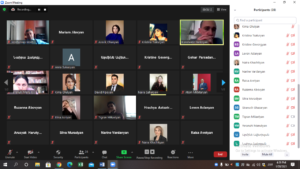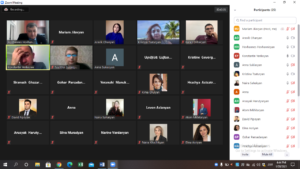Meeting with PhD Professionals
January 29, 2021
 The consortium members of ARMDOCT project and researchers involved in WP2 task force groups had a discussion with Professionals who have studied and defended their PhD dissertations in EU countries. The arranged meeting aimed at discussing issues which were raised during the implementation of WP1 and WP2 activities, as well as exchange of experience between participants.
The consortium members of ARMDOCT project and researchers involved in WP2 task force groups had a discussion with Professionals who have studied and defended their PhD dissertations in EU countries. The arranged meeting aimed at discussing issues which were raised during the implementation of WP1 and WP2 activities, as well as exchange of experience between participants.
Dr. Anna Sukiasyan (has conducted postdoctoral research at Charité – Universitätsmedizin Berlin and Technical University of Applied Sciences Wildau), Dr. David Pipoyan (conducted PhD research and defended at University of Tuscia) and Ms. Naira Sahakyan (is a PhD researcher at University of Amsterdam) presented their own experience covering the whole process of doctoral education in given countries (Italy, Netherlands and Germany). The admission requirements and enrollment of doctoral candidates, funding of doctoral education, general characteristics of the study programs, the organization of research, as well as supervision and defense experience were presented in particular, which was followed by a discussion based on the main issues and challenges WP2 five task force groups faced during the development of national level legal documents.
 As a result of presentations and discussion the main aspects of doctoral education and differences between Armenia and EU countries have been outlined, also suggestions were made by the invited professionals on the reforms of doctoral education in Armenia. The given suggestions were related to (i) the need for transition to one-tier scientific system promoting internationalization and ensuring comparability and recognition of the qualifications, (ii) revising the procedure and the level of state funding for PhD studies promoting high quality research, (iii) enriching educational component by in-depth courses on qualitative and quantitative research methods and research ethics, trainings aimed at developing professional and soft skills, (iv) fight against plagiarism by clarifying publication requirements taking into account the nature and field of research, as well as fostering international publications and promoting writing the thesis in foreign languages, (v) diversifying specialty codes and fields based on sectors giving opportunities to conduct international or interdisciplinary research, (vi) developing mechanisms which will allow foreign scientists to be involved in the process through joint research projects and co-tutoring, involving foreign experts in the process of defense, etc.
As a result of presentations and discussion the main aspects of doctoral education and differences between Armenia and EU countries have been outlined, also suggestions were made by the invited professionals on the reforms of doctoral education in Armenia. The given suggestions were related to (i) the need for transition to one-tier scientific system promoting internationalization and ensuring comparability and recognition of the qualifications, (ii) revising the procedure and the level of state funding for PhD studies promoting high quality research, (iii) enriching educational component by in-depth courses on qualitative and quantitative research methods and research ethics, trainings aimed at developing professional and soft skills, (iv) fight against plagiarism by clarifying publication requirements taking into account the nature and field of research, as well as fostering international publications and promoting writing the thesis in foreign languages, (v) diversifying specialty codes and fields based on sectors giving opportunities to conduct international or interdisciplinary research, (vi) developing mechanisms which will allow foreign scientists to be involved in the process through joint research projects and co-tutoring, involving foreign experts in the process of defense, etc.
